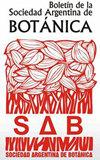南美洲南部含羞草(豆科)的选择型
IF 0.7
4区 生物学
Q4 PLANT SCIENCES
Boletin De La Sociedad Argentina De Botanica
Pub Date : 2018-04-20
DOI:10.31055/1851.2372.V53.N1.19887
引用次数: 1
摘要
南美南部含羞草(豆科)的lectotyptype。对阿根廷含羞草属(豆科)的3个分类群:M. obstrigosa Burkart、M. tandilensis Speg。和长iracemosa Burkart。本文还描述了用于指定选型的方法。本文章由计算机程序翻译,如有差异,请以英文原文为准。
Lectotipificaciones en Mimosa (Leguminosae) del sur de Sudamérica
Lectotypifications in Mimosa (Leguminosae) from southern South America. Three taxa of the genus Mimosa (Leguminosae) occurring in Argentina were lectotypified: M. obstrigosa Burkart, M. tandilensis Speg., and M. callosa var. longiracemosa Burkart. The methodology applied to designate the lectotypes is also described.
求助全文
通过发布文献求助,成功后即可免费获取论文全文。
去求助
来源期刊

Boletin De La Sociedad Argentina De Botanica
PLANT SCIENCES-
CiteScore
1.00
自引率
33.30%
发文量
46
审稿时长
>12 weeks
期刊介绍:
Bol. Soc. Argent. Bot. publishes original scientific works from the whole spectrum of Plant Biology (structure, anatomy, development, physiology, cytology, genetics, evolution, ecology, paleobotany, palynology, ethnobotany, etc.) in the diverse vegetable organisms and related groups (mycology, ficology, lichenology, briology, etc.), both in basic and applied aspects.
Taxonomic works (of systematics, phylogeny, monographs, revisions, lectotypifications, nomenclatural acts, descriptions of taxa), phytogeographic and phytosociological works (survey and classification of vegetation at different spatial scales and without restriction of methodological approaches) are considered for publication. Contributions that address complete phytogeographic units or sub-units and those that fill gaps in knowledge of vegetation in little-known territories are especially welcome. Extensions of geographical areas are published only when it comes to new citations for a country. Checklists and lists of annotated plants are not published.
Articles submitted for publication must be original and must not have been submitted to another publisher or previously published (print or electronic format). Submissions of papers already published in another language will not be accepted (autoplagio for translation).
 求助内容:
求助内容: 应助结果提醒方式:
应助结果提醒方式:


